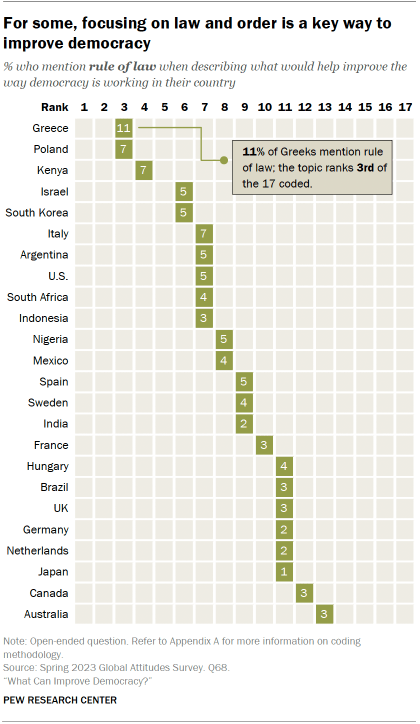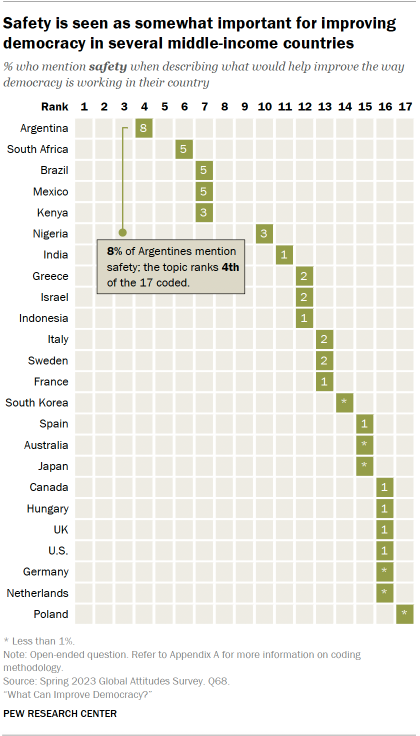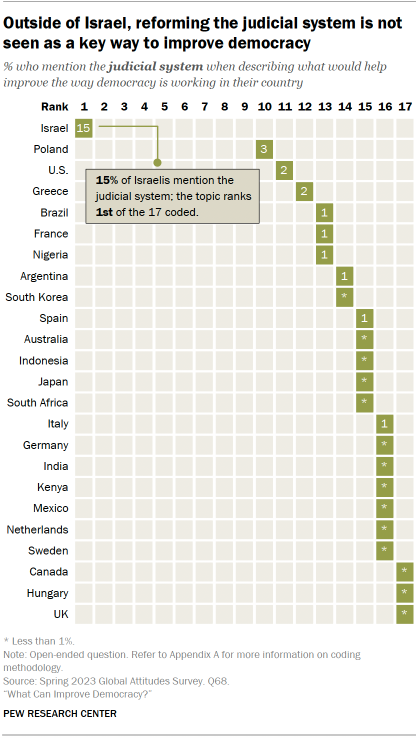In several of the 24 countries surveyed, rule of law issues and improving public safety rank toward the top half of the changes people say could help improve democracy in their country. And safety – whether that be reducing crime, supporting law enforcement or other policies – is particularly salient in some of the middle-income countries included in the survey (Argentina, Brazil, India, Indonesia, Kenya, Mexico, Nigeria and South Africa).
In most places, though, relatively few people think that it’s important to reform the justice system itself. Israel is the notable exception, where judicial system reform was the top focus for improving democracy. At the time of the survey in Israel, waves of protests in response to proposed judicial reforms were sweeping the country, and respondents were particularly focused on how implementing those reforms – or blocking them – would improve Israel’s democracy. (The survey preceded the Oct. 7 Hamas attacks and the January Supreme Court ruling that struck down the reforms.)
Rule of law

In Greece, Poland and Kenya, issues related to the rule of law rank toward the top among the changes people think would help improve democracy in their country. Elsewhere, the issue typically hovers in the top 10 of the 17 substantive topics coded, but it doesn’t make the top five.
Rule of law concerns run the gamut, from people calling for politicians to “follow the law” and “follow the Constitution” to specific changes related to enforcing existing laws – or doing so more equitably.
In some countries, older people are more likely to mention the topic than younger ones. For example, 7% of South Africans ages 40 and older mention rule of law issues, compared with 2% of adults under 40. Men are also somewhat more likely than women to mention the topic in some places surveyed.
“Leaders should execute their duties and their mandate well, according to the Constitution.”
Woman, 26, Kenya
In the U.S., conservatives (7%) are slightly more likely than liberals (4%) or moderates (3%) to mention the rule of law. The same is true in South Korea.
But, in Poland, those on the left are significantly more likely to mention the rule of law as a means to improve democracy. And those who have a unfavorable view of the right-wing populist party Law and Justice (PiS), which was governing at the time the survey was conducted, are substantially more likely to mention rule of law than those who view PiS favorably (10% vs. 1%). (For more information on how we classify populist parties, refer to Appendix E.)
Follow and enforce existing laws
Respondents who emphasize rule of law often issue simple declarations about the need to “follow the Constitution” or “respect the Constitution.” At times, they include specific invocations of the U.S. Founding Fathers or Indonesia’s Pancasila (the five-principle state philosophy set forth at Indonesia’s founding). Other times, they indicate that current lawmakers are not following the Constitution, as in the case of one woman in Poland who said, “Democracy is misunderstood in Poland. The Constitution is violated, and politicians don’t care what people think.” And sometimes, the emphasis is simply on respecting the existing founding documents of the country. As one woman in Spain said: “I don’t think anything else is needed to fix democracy except compliance with the Constitution.”
“In my opinion, to improve democracy in Italy, it would be enough to respect the existing laws and respect the people.”
Woman, 71, Italy
Beyond their country’s constitution, people call for the following of existing laws – essentially, “better enforcement of laws” already on the books. In Brazil, for example, one woman complained, “The laws that are created are often not enforced.” In Germany, a woman said, “The laws that we have should be more closely observed. That would change a lot.”
People also highlight the importance of equitably applying the law to all people in the country. One Indian man mentioned the importance of justice across social classes: “The legal system should not differentiate between the rich and the poor.” In Greece, some emphasized enforcing laws to prevent “favoritism” and allow “meritocracy.” (For more on issues of individual rights and equality, read Chapter 4.)
“Our democracy is a sham democracy. It protects those in power, and it is nonexistent for the powerless. If the law is not equal for everyone, democracy is gone.”
Man, 72, Italy
Applying laws to politicians – including prosecuting them, when needed
Anger about poor enforcement of the rule of law sometimes centers on politicians. One South African woman said democracy would improve if “we make sure we stick to the laws, irrespective of who breaks them. To create trust in this country, we need to get rid of corrupt officials.” Respondents also mention prosecuting corrupt politicians:
“Punish all the political governors who are thieves, removing them from office.”
– Man, 71, Mexico
“Immunity of representatives should be abolished.”
– Man, 37, Germany
“That accused officials can go to jail. Investigate them to see if they are honest and dedicated to the people.”
– Woman, 28, Argentina
“Taking [former prime minister] Raila Odinga to the International Criminal Court!”
– Man, 30, Kenya
Relatedly, people emphasize the need to prevent convicted or corrupt officials from continuing to hold office:
“End corruption, and elected officials must resign if they are indicted.”
– Woman, 56, France
“Members of the National Assembly should be disqualified if they are corrupt.”
– Man, 58, South Korea
“The leaders who have criminal cases against them should not have the right to contest elections.”
– Man, 19, India
“Politicians once convicted of a criminal offense or a crime of moral turpitude should be dismissed from public office immediately without any recourse and never be allowed to serve again.”
– Man, 71, U.S.
(For more on views of politicians, read Chapter 1.)
Ensuring safety

“Democracy in this country has been distorted. Lack of security could improve with the Armed Forces on the streets.”
Man, 46, Argentina
Public safety – including calls to reduce crime, improve policing and protect women – is also seen as a way to improve democracy, particularly in some of the middle-income countries surveyed. The issue appears in the top 10 named in Argentina, Brazil, Kenya, Mexico, Nigeria and South Africa.
In Argentina, which is in the midst of its worst economic crisis in decades, safety is ranked fourth of the 17 substantive topics coded – higher than any other survey country. Some Argentines tie crime and the economy together, as in the case of one woman’s declaration: “More work, less violence.”
In most other countries, though, focusing on safety is less of a priority to improve democracy.
Crime, safety and tougher punishments
Respondents who mention safety often focus specifically on lowering crime. They note that democracy would improve if there were “less murder,” “stricter laws for crimes against women and strict action should be taken against rapists,” and “more safety,” among other issues. These sentiments are present in both high-income and middle-income economies. For example, a Swedish man said, “Start with better laws and better sentences or penalties to get rid of all crime.” And a Mexican woman asked for “good governors to put an end to all crime, to have more surveillance.”
“As a democratic country, crack down on crime properly.”
Man, 69, Japan
Some of these responses focus expressly on safety for women. A woman in India had a list of changes, suggesting, “Technology should be improved, bribery should be stopped, women should be protected, women should be employed, education should be better, law and order should be maintained.” Another woman in Mexico suggested that the government “pay more attention to what they need to do to support women who suffer violence, rape or mistreatment.” But women were not the only people calling for this democratic improvement: “Women and children are dying every day; can’t they increase security in our country?” asked a South African man.
Concerns about crime and safety lead some to favor stricter punishments for criminals. For example, people mention the need for “a tougher hand with criminals,” and generally “stricter laws.” They also offer specific policy solutions, including calls to reinstate the death penalty and put in place more severe punishments and prison sentences.
The role of law enforcement
“The police should stop corruption and respect the law. Corruption is what makes people lose confidence in the country. Even those who work in government should be ethical and respect the laws of the country.”
Man, 40, South Africa
For many people who highlight safety as a means to improve democracy, empowering law enforcement is a good place to start. “We can make democracy improve by having strong institutions. The Constitution should be respected, the security personnel should do their best in making sure rules are respected,” said a Nigerian man. And an Australian woman suggested, “Pay police the same amounts CEOs get and then we might attract better people to the job.”
Others take issue with the disrespect that police forces face in their country, like a German man who said, “Crack down on people who show toughness against the police, fire brigade and rescue workers. A quick deportation of people who do not comply with law and order.” And a French woman thought people should “respect the law, respect the police, respect your superior, no violence.”
“Laws that effectively treat police and politicians equally when they commit unlawful acts against the public. We should not place them above others by the nature of their positions. These changes alone would mitigate many cases of corruption and abuse of power being seen today.”
Man, 53, U.S.
Still, questions of police corruption, their immunity from prosecution and the need to apply the law to them were top of mind for some respondents. In the U.S., there were some who called for “abolishing the police,” while in Israel, people were sometimes critical of police violence against the Arab community. For example, one Israeli woman said, “The police should treat Arabs as citizens and not as terrorists.”
Safety and immigration
In South Africa and the U.S., some responses appealing for safety mentioned border security specifically. For example, one South African man suggested his country “close our borders, minimize crime.” Another South African man said, “Strict security on the country borders, more visible policy to reduce crime.” An American woman felt similarly that immigration and crime were linked: “Take care of American citizens first, take care of crime and prosecute criminals, close borders.” And another U.S. woman said, “Finish the wall at the border and prosecute street gangs and criminals.”
The judicial system

In most countries surveyed, people stop short of calling for changes to the judicial system as a way to improve their nation’s democracy. Outside of Israel, the issue never ranks higher than 10th among the 17 substantive topics coded.
In Israel, however, judicial system reform is the top issue of those coded. And the issue comes up more among Israelis on the ideological right (21%) than those in the center (11%) or on the left (10%). Israelis who see large divisions across ideological lines or between parties in their country are also about twice as likely as those who don’t see strong conflicts to mention judicial system reform.
In the U.S., those on the left are more likely to mention judicial system reform than those on the right.
The people who suggest judicial system reform often fit squarely into two groups: 1) those who want “less judicial activism” and “less interference” from judges; and 2) those who want their judges to be more independent and thus less subservient to politicians.
Keeping judges out of politics
“Less interference from the judiciary.”
Man, 60, Brazil
Some express concerns about judges meddling in politics – essentially, creating legislation from the bench. For example, one American man complained that “activist judges” were “making laws instead of applying the laws as written.”
A Spanish man also focused on the conflict between the legislative branch and the judiciary, noting, “It would be better if the justices did not interfere so much in the work of the government. I believe that the government has to govern and that the judges are oppositional. They should not be doing political work.” In Spain, the survey was fielded a few months after the Spanish Constitutional Court blocked a parliamentary initiative focused on simplifying the method of electing court members.
Keeping politics out of the judicial system
In some countries, the concern centers more on politicians meddling in the justice system – with calls for the judiciary to have “true independence.” In Poland, for example, years of judicial reform have focused on allowing political oversight of judges, leading to clashes with the European Court of Justice around the time of the survey. Polish respondents highlighted the need to elect new judges to the Constitutional Tribunal and change the people on it – or, as one woman said, “reelect the Constitutional Tribunal without politicians.” (For more on views of politicians, read Chapter 1.)
People elsewhere also highlight the political nature of judges. In the U.S., for example, one woman said that “nominees for the Supreme Court should not be denied by Congress if they are qualified. There must be a way to control extremely partisan judges???” In the UK, another woman emphasized how “the courts are quite biased” and democracy would improve with “more impartial courts.”
Israel: Tension between interference and independence
“To not let the legal reform go through and eliminate the Court and all the gatekeepers.”
Woman, 41, Israel
In Israel – where, at the time of the survey, the government was pushing a controversial “reasonableness” bill meant to weaken the Supreme Court’s power to cancel government decisions – people mentioned both interference and independence.
For example, concerns about interference centered on “eliminating the High Court’s tyranny” and “curtailing the unlimited power that the High Court appropriated to itself.” Given the timing of the survey, people also focused on the need to push through the then-pending legislation, as in the case of one man who said, “We should quickly complete the legislation of Yariv Levin and cut off, once and for all, the head of the snake in the form of the legal system headed by the High Court.”
“To pass the laws that will limit the unbridled power of the court that acts as if our country was its private property.”
Woman, 19, Israel
Those focused on the independence of the judiciary highlighted the need to “preserve the court,” to “keep the Supreme Court independent and not subordinate to anybody or entity,” and to “do everything to keep the last word of the High Court on any social and moral issue.”
“In order to improve democracy, the judiciary must be fixed. Courts lack clerks, they save money and do damage. I prefer they spend more and make the law work. Some services take years to obtain, for sentences to be carried out.”
Man, 82, Italy
Improving day-to-day functioning of the judiciary
Many of the other ways that people want to fix the judicial system focused on its day-to-day operation. For example, respondents in multiple countries highlight the speed of decisions:
“Judicial processes should be expedited!”
– Man, 18, Argentina
“The judiciary should be reformed so court proceedings are faster.”
– Man, 65, Italy
“Cases should be adjudicated faster.”
– Woman, 45, Greece
Others note that certain services were limited during the COVID-19 pandemic and have not yet returned, saying there is more need for “access to the courts.” Some people call for technological changes, like offering live proceedings.
Supreme Court reform in the U.S.
In the U.S., while there are many different suggestions for judicial reform, one common refrain was the need for changes specifically in the Supreme Court. Many of these responses center around term limits for justices. People express concern about the lifetime nature of court appointments and about long-serving justices getting out of touch.
For example, one woman said, “We should limit the terms of the Supreme Court justices to 10 years. Some of them are so old and have very conservative views of the world, and their beliefs are no longer in sync with the rest of the U.S. Democracy means options and choices – so how can we have democracy when we are stuck with the same Supreme Court judges year after year?” Another woman noted, “Terms should be shorter, because if someone does a bad job, it’s hard to get them out.” These sentiments lead to some calling specifically for a mandatory retirement age.
Still others focus on changing how justices are appointed, including:
“Having term limits for Supreme Court justices that are staggered so that each president can choose one justice during his or her four-year term.”
– Woman, 60, U.S.
“Add more judges to the Supreme Court.”
– Woman, 54, U.S.
“The Supreme Court should have an equal number of judges across parties.”
– Woman, 71, U.S.
“U.S. Supreme Court justice confirmation should not be subject to Senate majority party discretion.”
– Man, 73, U.S.
And, while a code of ethics for the Supreme Court has come out since the survey was fielded, at least one respondent noted a need for that.




